Education
How does Utah stack up against Colorado?
This op-ed by Voices for Utah Children State Priorities Partnership Director Matthew Weinstein first appeared in the Salt Lake Tribune on June 18, 2016.
It is often said that Utah and Colorado are peer states, a pair of high-altitude economic powerhouses competing to attract the same growth-minded businesses and mobile workers in search of the best quality of life. What lessons can we learn from Colorado, and what can they learn from us?
The two states have many economic similarities — rapid growth, young populations, high household incomes, low poverty and unemployment rates, strong business climate rankings. But where do the similarities end? And which is better poised for stronger growth going forward? Our children's futures depend on being able to answer these questions and learn lessons from peer states like Colorado.
Earlier this month, Voices for Utah Children released the first half of our two-part comparison of Utah and Colorado, comparing the two states for 21 measures of economic opportunity. The results shed light on these questions and include a lot of good news for Utah, as well as some caution signs — and at least one "red alert" warning.
Utah ranks among the very best states in the nation for our low level of income inequality and high rate of intergenerational social mobility. A child growing up in a lower-income family in Utah has a better chance than elsewhere of making it into the middle class. This is thanks to a combination of factors, including our strong commitment to equalizing educational revenue among the wealthier and poorer areas of the state, our success at preventing geographic concentration of poverty, the highest rate of two-parent families in the nation, and our strong charitable and religious institutions that do such a great job of mobilizing volunteers to help neighbors in need.
While Colorado ranks more in the middle of the pack for income inequality and social mobility, our neighbor to the east shines when it comes to educational attainment, with one of the highest rates of bachelor's degrees in the nation. In 2014, 39.4 percent of Colorado adults age 25-64 had a bachelor's degree, nearly 8 points above the national average of 31.5 percent. For historical perspective, in 1990 Colorado's lead over the nation for bachelor's degrees was only 6.5 percentage points.
By this very important metric, unfortunately, Utah's trend is in the opposite direction. In 1990 we led the nation by 1.3 percentage points for bachelor's degrees. But our lead has been steadily diminishing since then, and in 2014, for the first time on record, Utah fell behind the nation for bachelor's degrees among adults age 25-64. Moreover, data for millennials — adults age 25-34 — indicate that this trend will only worsen in the years to come.
This is the red alert warning mentioned above. Falling behind on college degrees could have grave consequences for Utah's ability to grow good jobs and compete for high-wage industries in the years to come. We already lag far behind Colorado in worker productivity — by nearly $10,000 per worker — which is the economic basis for wages and standard of living.
If there is one glimmer of hope for Utah in the college comparison, it's that, even after all the budget cuts and tuition hikes of the last decade, we continue to invest more than Colorado in our public universities — $7,752 per student vs. $4,754. That helps keep tuition 35 percent lower in Utah than next door, though at $6,363 on average, it is still 37 percent higher than before the Great Recession.
But the investment edge that Utah enjoys in higher ed vanishes at the early end of public education. Not only do we invest less per pupil in K-12 than any other state, including Colorado, we are weakest when it comes to pre-K and kindergarten. Only 13 percent of our 4-year-olds attend public pre-school vs. three times that in Colorado. And a similar share attend full-day kindergarten here vs. 74 percent in Colorado.
And while we find good news in the 4th and 8th grade NAEP math and reading assessments, where Utah's performance jumped sharply to 14th place in 2015 from 23rd in 2013, we remain far behind when we adjust the scores for demographic differences. Our demographically-adjusted NAEP ranking only improved from 47th place to 44th, while Colorado fell from 12th to 22nd.
As Utah builds on our many assets and grapples with our challenges in the years to come, we believe this benchmarking information can contribute to understanding why we are succeeding and how we can ensure our continued success in the years and generations to come.
Read the complete reports here:
A Comparative Look at Utah and Colorado:
For 30 years now, Voices for Utah Children has called on our state, federal and local leaders to put children’s needs first. But the work is not done. The children of 30 years ago now have children of their own. Too many of these children are growing up in poverty, without access to healthcare or quality educational opportunities.
How can you be involved?
Make a tax-deductible donation to Voices for Utah Children—or join our Network with a monthly donation of $20 or more. Network membership includes complimentary admission to Network events with food, socializing, and opportunity to meet child advocacy experts. And don't forget to join our listserv to stay informed!
We look forward to the future of Voices for Utah Children and we hope you will be a part of our next 30 years.
Special thanks to American Express for sponsoring our 30th Anniversary Year. 
Helping Candidates Do Their Homework
2016 Candidate Briefing Guide
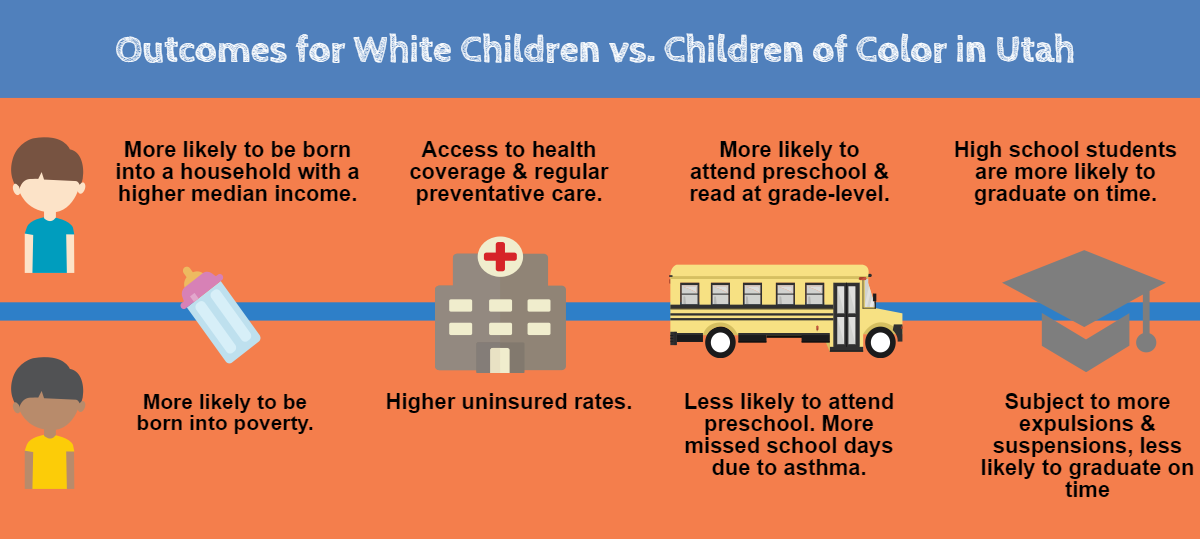
2016 is an important election year in Utah. The public offices on the ballot in November include the following:
- U.S. Senate
- U.S. House of Representatives
- Governor and Lt. Governor
- Half of the State Senate
- The entire Utah House of Representatives
Our elected officials play a central role in determining whether all children have the opportunity for health, safety, education, and economic security. As the Utah child population grows and becomes more diverse, it is important for candidates to discuss the needs of Utah children and the policies they would pursue to ensure that all Utah's children can thrive.
Voices for Utah Children is providing candidates for elected office in Utah with the resources in this Candidate Briefing Guide to help them understand the challenges facing Utah's children, direct public awareness and dialogue toward the needs of children over the course of their campaigns, and begin their terms of office prepared to enact effective policies to protect their youngest constituents.
Utah voters can also use these resources to educate ourselves about children’s issues as we seek to elect candidates that will prioritize the needs of children and invest in our state’s future.
More Information:
Racial and Ethnic Equity for Children in Utah: What we learned from the 2016 Legislative Session
Economic Security/Tax & Budget
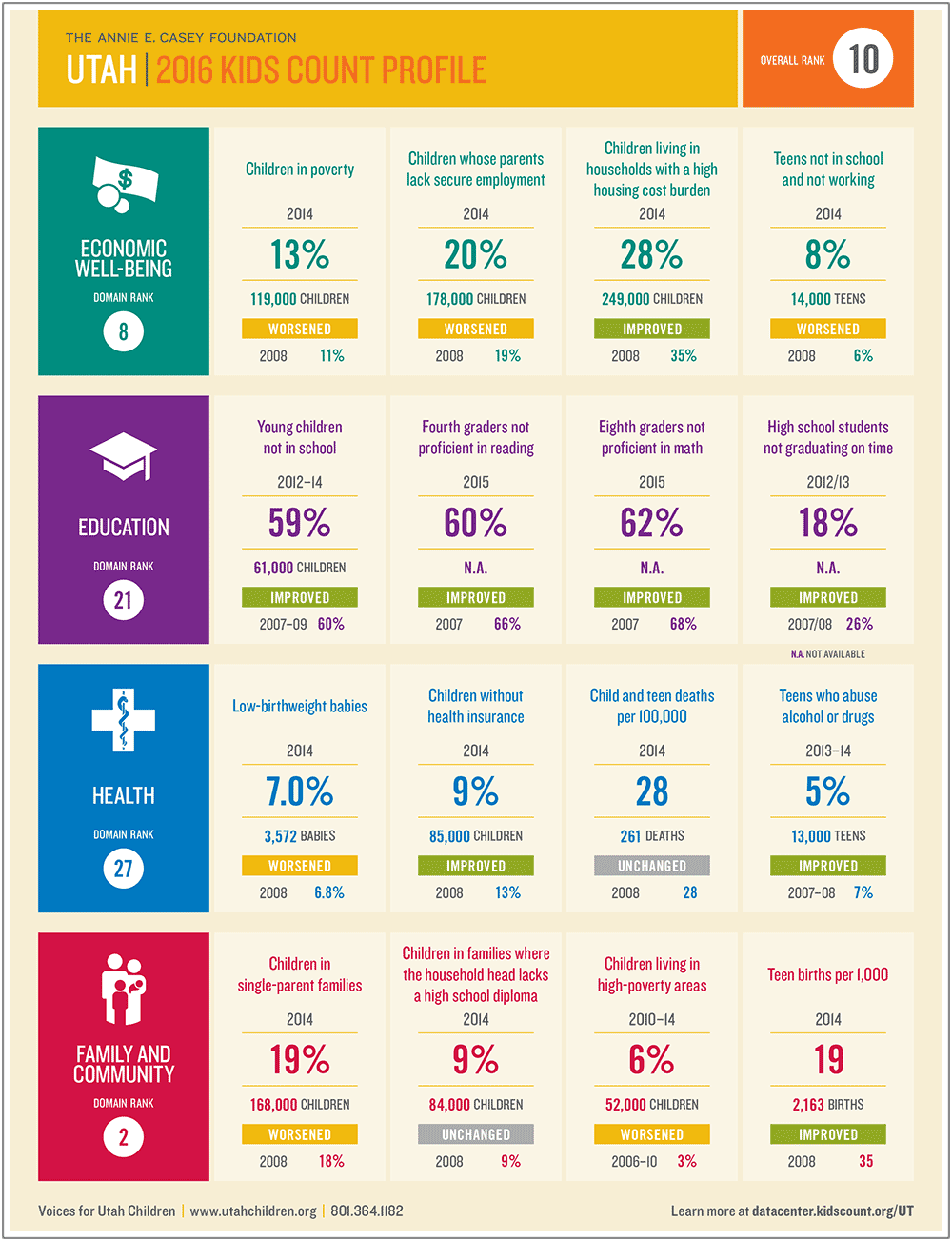 Supported by the Annie E. Casey Foundation, our KIDS COUNT® work aims to provide Utah’s legislators, public officials and child advocates with reliable data, policy recommendations and other tools needed to advance the kinds of sound policies that benefit children and families across the state.
Supported by the Annie E. Casey Foundation, our KIDS COUNT® work aims to provide Utah’s legislators, public officials and child advocates with reliable data, policy recommendations and other tools needed to advance the kinds of sound policies that benefit children and families across the state.
This year, Utah barely held on to its position among the top ten in the annual Annie E. Casey Foundation KIDS COUNT® Data Book report. Ranking 9th in 2015, Utah now ranks 10th among the fifty states (despite a dramatic change in the health domain, where Utah dropped from 7th in 2015 to 27th in 2016). Utah’s 2nd place ranking for the Family & Community domain and 8th place ranking for Economic Well-Being remained unchanged. In the Education domain, Utah ranked 21st — up from 29th in 2015.
Terry Haven 
Deputy Director
Voices for Utah Children
More Information:
Measures of Well-Being in Utah, 2015
![]() 2016 Utah and United States Kids Count Profiles
2016 Utah and United States Kids Count Profiles
The Federal Safety Net Cuts Child Poverty in Utah in Half
Each child brings the promise of a healthier, stronger future for Utah. To make good on that promise, Utah needs to make sure children can grow up healthy, from the prenatal period all the way through their teenage years.
Utah children and families should have access to:
- Appropriate prenatal care;
- Affordable, accessible, culturally competent care that encompasses both prevention and treatment; and
- Supportive services and environments designed to help facilitate the best possible health outcomes.
All families in Utah must be able to achieve optimal health in order for our state to continue to grow and prosper.
Jessie Mandle, MPH 
Health Policy Analyst
Voices for Utah Children
More Information:
12-Month Continuous Eligibility for Children on Medicaid
Utah's Uninsured Rate for Hispanic Children: Highest in the Country
A Coverage Gap Solution for Utah Families
Majority of Eligible Parents Who Would Benefit from Medicaid Expansion are Working
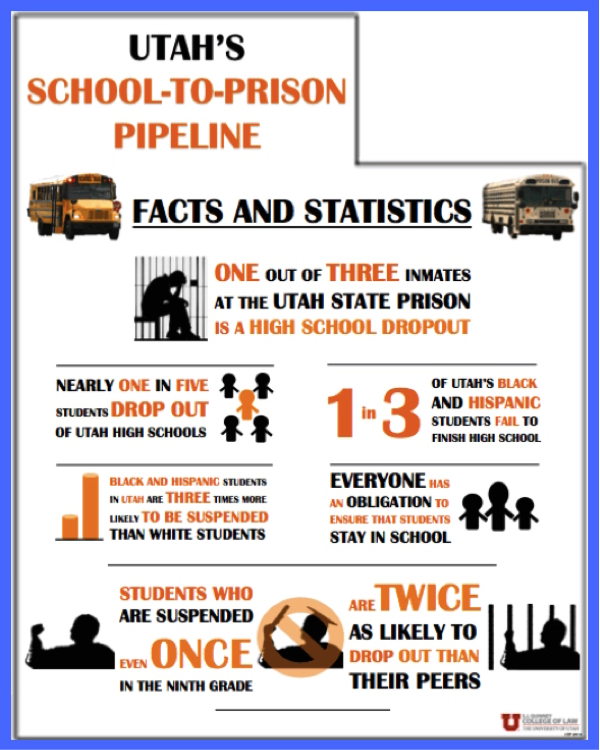 Voices for Utah Children seeks to reduce juvenile incarceration rates and eliminate the inappropriate use of secure confinement and out-of-home placement, ensuring that juvenile correction systems better protect youth and the public.
Voices for Utah Children seeks to reduce juvenile incarceration rates and eliminate the inappropriate use of secure confinement and out-of-home placement, ensuring that juvenile correction systems better protect youth and the public.
A key aspect of our juvenile justice work involves a commitment to challenging the School-to-Prison Pipeline, wherein children — particularly children of color and those with disabilities — are funneled out of public schools and into juvenile and criminal justice systems in a discriminatory application of discipline. “Zero-tolerance” policies criminalize minor infractions in the classroom, while the presence of law enforcement officers in schools often leads to student behavior being criminalized rather than handled within the school setting.
We are committed to the belief that children should be educated, not incarcerated. We work to empower advocates and community members alike, arming people with information that allows them take action to end School-to-Prison Pipeline.
Lincoln M. Nehring, JD 
President & CEO
Voices for Utah Children
The early years in a child’s life form the core foundation for later social, emotional and cognitive development. Done well, early childhood education can help level the playing field, especially for low-income children, by closing the access and achievement gaps, thereby enhancing not only school performance, but self-sufficiency over a lifetime.
At Voices for Utah Children, we focus on promoting targeted investments in early childhood education, with the goal of creating a statewide early learning system in Utah that supports all families by making sure they have access to high-quality options for their children’s early care and learning—whether children spend their days at home, in formal child care, or with family and friends.
Tess Davis, JD 
Policy Analyst
Voices for Utah Children
More Information:
Optional Extended-Day Kindergarten
5 Minute Guide to Shared Services
Economic Security/Tax & Budget
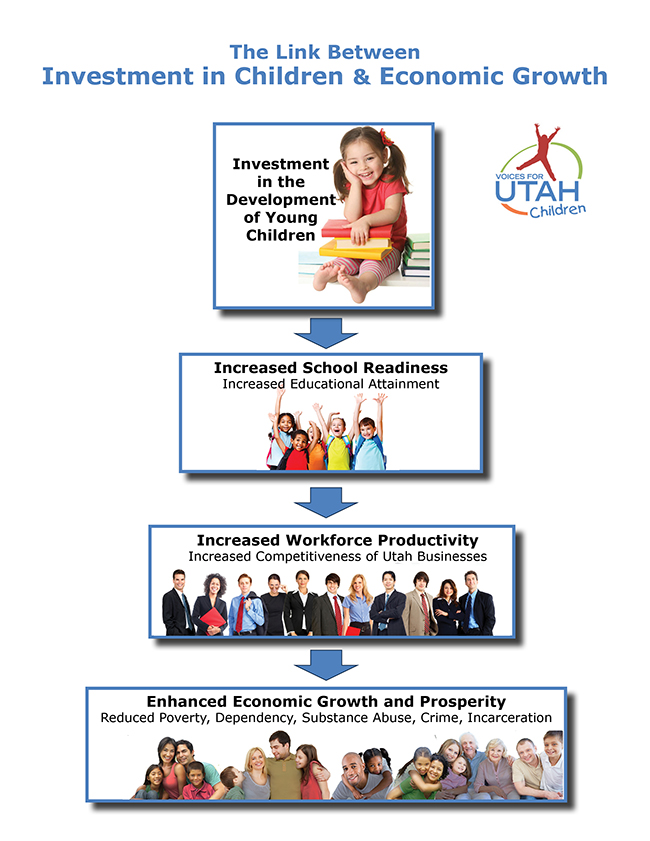
Every day, state governments raise and spend tax revenue in ways that profoundly affect families and communities. The fiscal choices Utah makes — about investing in schools, health care, child care, and other services — can help foster equal opportunity and lay the foundations for our future growth and prosperity.
Voices for Utah Children's fiscal policy program works to ensure that we invest sufficient resources in the vital public systems that ensure that our kids get world-class education and health care as well as special support for children most in need. We also work to ensure that public revenues are generated in ways that are fair; no family should be taxed into poverty as the price of educating their children.
Matthew Weinstein, MPP 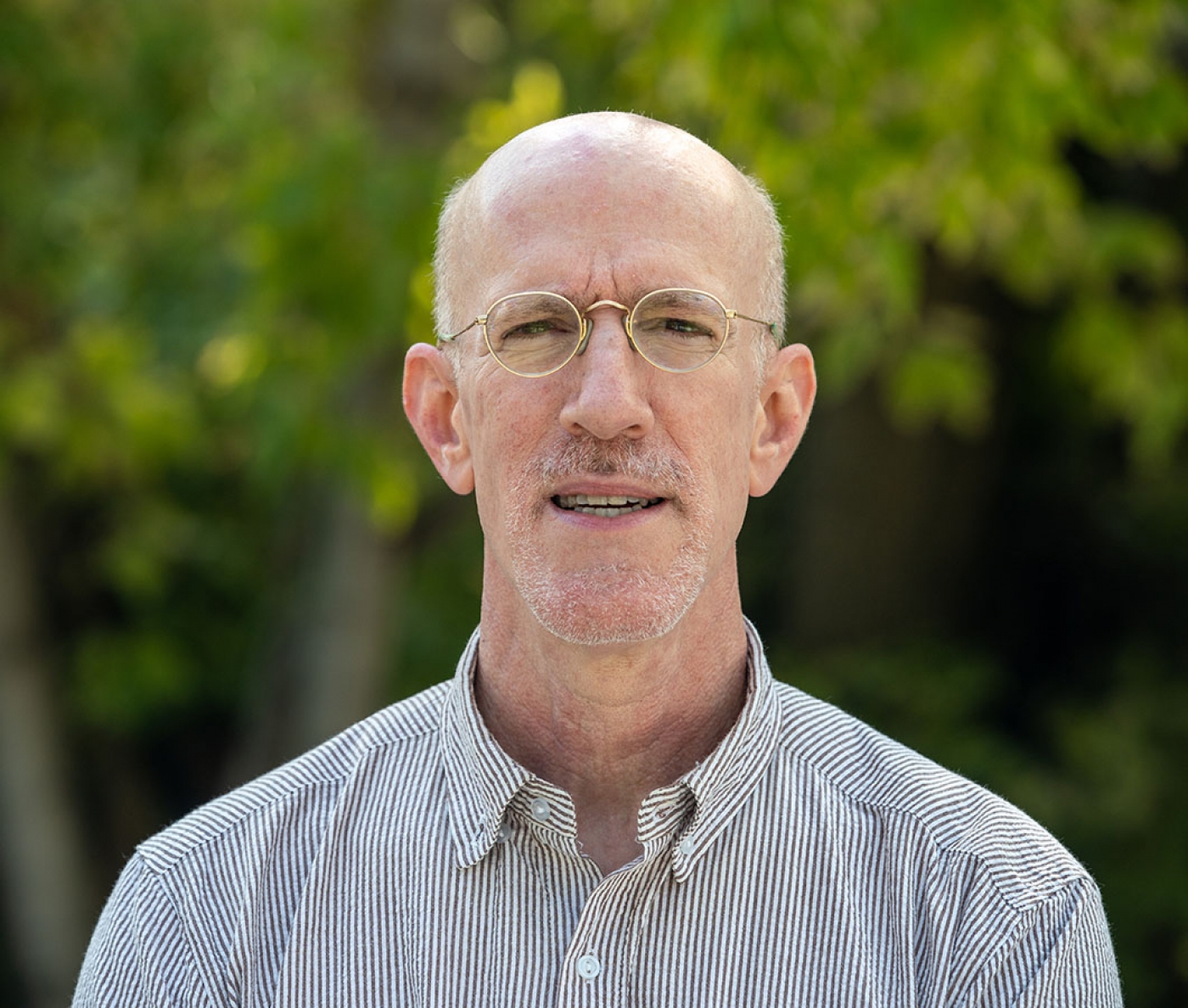
State Priorities Partnership Director
Voices for Utah Children
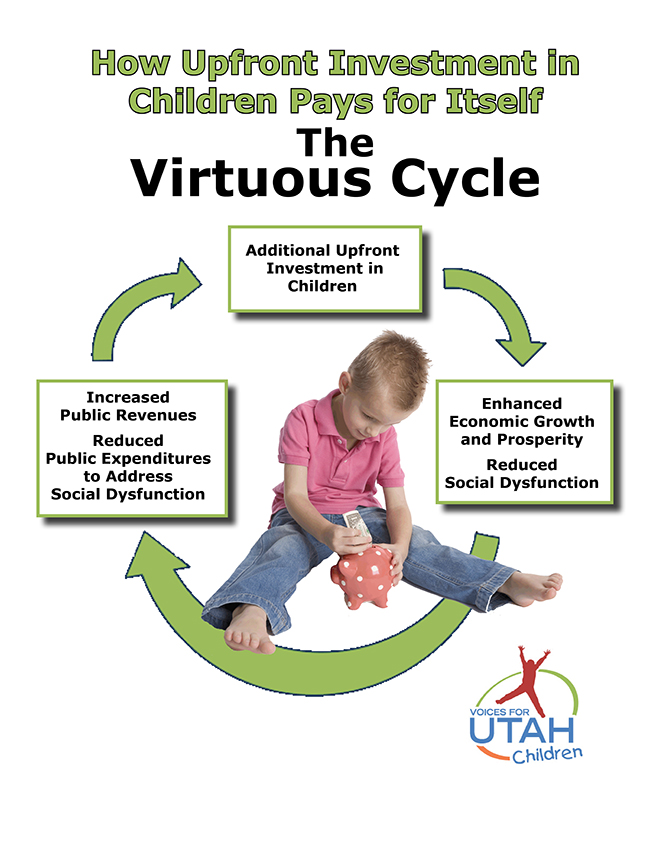
More Information:
Utah Children's Budget Report 2015
What's Still Eating Utah's General Fund?
Top 10 Reasons to End the Earmarks
Deseret News: Social service advocates call for lawmakers to 'end the earmarks'
Utah Policy.com: Poll: Utahns Split on Eliminating Transportation Earmarks
A Comparative Look at Utah and Colorado:
Part 1: Economic Opportunity
Part 2: Standard of Living
The Earned Income Tax Credit: A Time-Tested Two-Generation Strategy for Poverty
For 30 years now, Voices for Utah Children has called on our state, federal and local leaders to put children’s needs first. But the work is not done. The children of 30 years ago now have children of their own. Too many of these children are growing up in poverty, without access to healthcare or quality educational opportunities.
How can you be involved?
Make a tax-deductible donation to Voices for Utah Children—or join our Network with a monthly donation of $20 or more. Network membership includes complimentary admission to Network events with food, socializing, and opportunity to meet child advocacy experts. And don't forget to join our listserv to stay informed!
We look forward to the future of Voices for Utah Children and we hope you will be a part of our next 30 years.
Special thanks to American Express for sponsoring our 30th Anniversary Year. 







